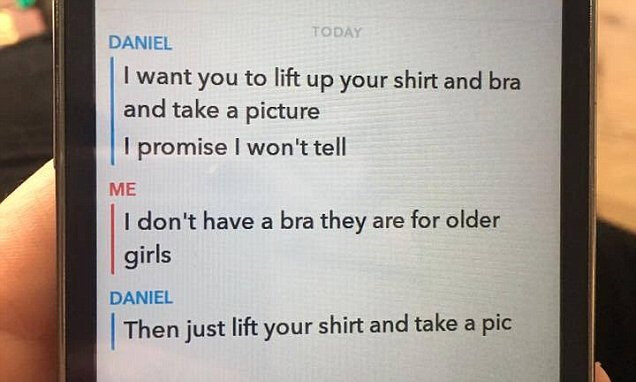What Is Sexual Grooming and What Should Parents Know?
Dangerous Sexual Grooming Online
ALL TOPICS
- YouTube Parental Control
-
- How to see your YouTube history?
- Put parental controls on YouTube
- Delete TikTok Account without Phone Number
- Ways to block YouTube channels
- Ways to Get Somone's IP Address and Hide IP Address
- A complete guide on YouTube parental control
- Kids safe YouTube alternative
- Top 5 TikTok Alternatives
- Methods to restrict YouTube adult content
- Social Media App Parental Controls
- Parental Control Tips
Dec 12, 2025 Filed to: Teen Sexting Proven solutions
Growing up in this era is a challenge. With the rise in electronic communication and endless activities available on the Internet for children, they are exposed to numerous digital dangers, for instance, sexual grooming.
Sexual grooming is when a person develops a relationship, builds trust and an emotional connection with a minor so that they can take advantage of them sexually, exploit, or traffic them. Child grooming is often done online through social media apps like Instagram, text messages, and messaging apps like WhatsApp, video chats, and gaming sites.
You can do online child grooming over a short or long time. At times the sexual predators go to the extent of building a relationship with the minor's family and friends to earn their trust so that they never suspect their ill intent towards the child!

In this article, we look in detail at signs of grooming, sexual predator characteristics, and how to handle the issue to save young people from this digital danger. Read on.
Dangerous Signs of Online Grooming
It is not easy to figure out whether your kid is sexually groomed or not since the signs are not visible and, in most cases, hidden. It is even more difficult when your kid is a teenager. Parents often assume it's the "normal" teenage behavior, yet there is more to what meets the eye.

However, all hope is not lost. Now, besides having an open relationship with your kid, you can create an environment where they openly share what is going on in their lives. Here are some signs of grooming you should keep an eye out for:
- Your kid becomes very secretive and doesn't share how they are spending their time, who their new friends are and where they are from, whether in real life or online.
- When your teenage kid has an older boyfriend or girlfriend.
- When you notice your kid in possession of new stuff, e.g., clothes, phone or shoes, or money, and they can't or won't explain how they got them.
- When there is a drastic change in how much time your kid spends online or on their devices.
- When you see them upset, withdrawn, or distressed and won't share what is bothering them.
- When out of the blues, you notice sexualized behavior and language in their character. Plus, you figure out they have a queer understanding of sex that is not right for their age.
- When they start spending more time away from home and go missing for periods.
More often than not, a kid won't notice that they are getting groomed sexually. Instead, they might be worried and confused and very much unlikely to open up about their worries to an adult they trust.
Whenever you notice something is off with your kid, smartly approach them and create a conducive space for them to open up, don't push it. Be gentle even when broaching the sensitive and challenging conversation with them. Otherwise, they will pull away and shut down.
Now lets us look at how you can identify a sexual predator.
How to Spot a Sexual Predator?
Now, before looking at the most common predator grooming behaviors, you should know who the predator could be. "Of course, predators are those weird strangers lurking in the park for no apparent reason. It could be some guy in some remote place locked up in their tiny room, glued to their screens prying on innocent kids who want to play games and be the kids that they are! Right?" Wrong!
On the contrary, these are people your kid knows pretty well. They are cordial cunny people who have it easy to earn the trust of others. They could be staff at your kid's school, or your church, a nanny, or even a family member. Yeah! The ones you least expected.
Despite being like any other "normal" person, these perpetrators use a particular way of sexual grooming. The grooming behaviors are methodical, subtle, and gradual. Their approach is slow, well planned out, and advance in stages.
Below are the six most common grooming characteristics you need to know:
- Creating a bond: Sexual predators look to develop a relationship with the target child. They tend to spend more time with the kid and seem to be very interested in building a connection with them. They will shower the kid with gifts, give them extra attention, and even take lots of pics with them.
- Testing boundaries: After getting close to your kid, they now find out their reaction to sexually suggestive games and jokes like truth-or-dare or strip games. Sexual predators bloom in secrecy, and testing boundaries helps them figure out when they can play their next card, without being caught, of course.
- Getting touchy: They start with non-sexual touches like high-fives and casual hugging. Next, they advance to inappropriate touching that is made to look unintentional. They may accidentally graze a private part of the kid's body to see how they react—this graduate to kissing or having the child sit on their lap.
- Instilling fear: Sexual predators intimidate the kid to prevent them from telling another person about the molestation. They even use threats to them or the people they love. They can also make the kid feel guilty and embarrassed by telling them that no one will believe them if they tell.
- Sharing sexually explicit items: Once they have scared the kid into keeping their mouth shut, perpetrators proceed to share sexual content in the form of pics, videos, and messages. It is their way of normalizing sex. They even use sexual terms and talk freely in your kid's presence.
- Maintaining secret communication: Sexual predators find any means to keep communicating with the kid in secrecy, mainly through emails, texts, and calls. Since they thrive in secrecy, they will always ensure the kid keeps everything silent.
Now that you know about the sexual predator characteristic, how can you put a stop to these sexual advances when you notice them? That's what we look at next. Keep scrolling.
How Can Parents Handle Such Problem?
We look at two ways you can handle this situation:
Normal means
These are done in person and referred to as confronting with kindness. To help protect your child.
- Excuse yourself and ask to speak to the person for a moment. Then explain to them the boundaries you have set for your child and why you have them.
- Request them to respect those boundaries.
If the person was genuinely innocent in their behavior, they would be sorry and strive to set boundaries. In case they meant ill, they will be caught aback and steer away from making any advances on your kid now that you are watching.
Otherwise, you can inform the authorities and have them deal with the individual accordingly.
Apply Parental Control Method to Receive Alerts on time
Online platforms like Facebook, Twitter, WhatsApp, TikTok have become where sexual predators love to find their new targets. To keep our kids safe, parents should pay close attention to who kids talk to online and what topics they are discussing.
However, it may be difficult for parents to monitor their kid's online activities as they can't get their phones. Or their kids would refuse to let them look into their phones.
That's why we would recommend FamiSafe to you. FamiSafe is the most reliable parental control app you can use to get alerts on any suspicious content on your kid's device. It is useful in cyberbullying prevention, sexual predator detecting, location tracking, app blocking, screen time monitoring, etc.
Some of the important features of FamiSafe are listed below.
- Explicit content detection: Child grooming includes luring your kids to send nude pictures or explicit messages to them. Parents can create their own suspicious words list and receive an alert when they are sent or received in their kid's device.
- Suspicious photos: If your kids take nude pictures of themselves or receive photos from a person who is sexually grooming his/her via social platforms and store them in their phones, parents can receive alerts using the Suspicious Photo as it will detect photo that includes nudity or sexual content.
- Activity report: It enables parents to know which applications/sites have been used and tells how much time was spent there.
- App blocking: The parent has the power to block any suspicious apps on their kid's phone to avoid their kids from overusing them or using them to get in touch with sexual grooming people.
- Smart Schedule: To prevent kids from staying late chatting with strangers, parents can use Smart Schedule to schedule a plan and block social apps or messages.
- Location Tracking & Geo-fencing
- App Blocker & Web Filtering
- Web Filtering
- Screen Time Control
- Smart Parental Control Setting
Child grooming is prevalent in today's society, and many kids suffer in silence. Sexual predators are very sleek in their ways, and secrecy is their golden rule. Therefore, parents must stay informed and alert at all times. Parents should get involved in their kids' lives and create an open relationship where they feel free to open up to them about anything and everything.
Also, they should utilize parental control apps like FamiSafe to help protect their children from digital dangers. Remember to keep an eye out for the predator characteristics and never take anything lightly when something seems off with your kid.



Ankhi Bhattacharya
contributor Editor